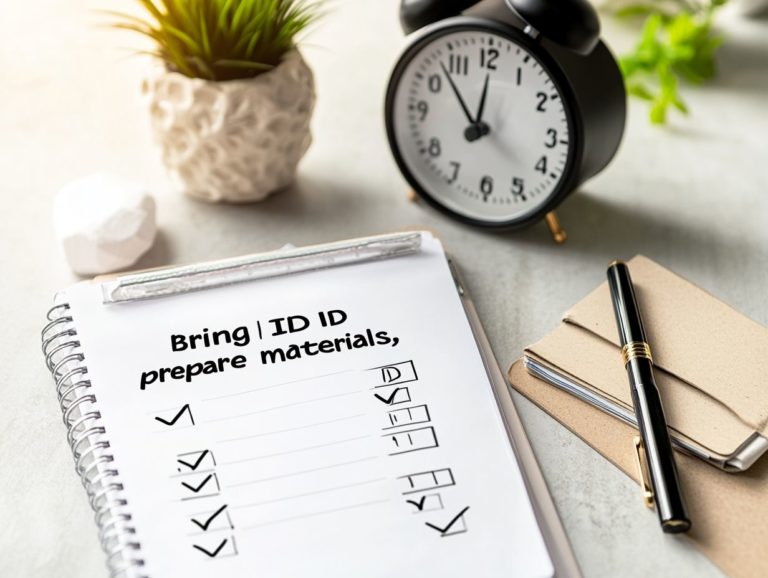how to promote healthy study habits for tests
Effective studying is more than just cramming. It combines strategy, organization, and self-care.
Healthy study habits are vital. They significantly impact your academic performance.
Discover key techniques to help you stay organized and focused.
Master test anxiety, take regular breaks, and enjoy the benefits of studying with peers.
Contents
- Key Takeaways:
- The Importance of Healthy Study Habits
- Creating a Study Schedule
- Staying Organized and Motivated
- Healthy Study Environment
- Managing Test Anxiety
- Incorporating Breaks and Self-Care
- Collaborating with Peers
- Frequently Asked Questions
- What are some good study habits to follow when preparing for tests?
- Why is it important to promote healthy study habits for tests?
- How can I create a study schedule that works for me?
- What are some active learning techniques I can incorporate into my studying?
- How can I stay motivated and focused while studying for tests?
- What are common mistakes to avoid when promoting healthy study habits for tests?
Key Takeaways:

- Healthy study habits are crucial for academic success.
- Effective time management and organization are key to creating a successful study schedule.
- Maintaining motivation and focus, along with a comfortable study environment, greatly improves studying.
The Importance of Healthy Study Habits
Healthy study habits are essential if you want to elevate your academic performance and learn how to stay motivated during test prep through refined strategies and techniques.
Effective studying boosts your memory and helps you understand the material better, leading to better results in exams and assessments.
Research shows that students who establish productive routines like self-testing and effective note-taking greatly enhance their cognitive function and retention, and learning how to use study groups for test-taking success can further improve these skills.
Start using productive study routines to unlock your academic potential!
Impact on Academic Performance
Your study habits have a significant impact on your academic performance. To enhance your effectiveness, it’s also crucial to consider how to take care of your health during test prep, as effective studying directly correlates with achieving your goals and excelling in exam preparation.
Don t underestimate the power of specific study techniques that enhance your learning experience. Strategies like active engagement invite you to dive deeper into the material.
Instead of just highlighting passages, try summarizing key concepts in your own words. This approach can greatly improve retention.
Embrace distributed practice by spacing out your study sessions. This method is more effective for long-term memory than cramming the night before an exam. Additionally, learning how to take breaks while studying for tests can enhance your focus and retention. Adding practice tests to your routine can provide immediate feedback and boost your confidence.
Set clear, achievable goals like dedicating specific hours each week to these techniques to elevate your exam performance.
Creating a Study Schedule
A well-structured study schedule is essential for mastering time management and enhancing your study routine.
A thoughtfully crafted schedule helps you allocate time across subjects, covering all necessary materials while incorporating breaks to boost concentration and mental wellness.
Academic coaches suggest assessing your priorities and using organizational tools for a balanced approach to studying and revision.
Effective Time Management Techniques
Effective time management techniques are crucial for optimizing your study routine while balancing academic duties and personal life.
Using proven strategies can enhance your focus and productivity, turning last-minute chaos into a well-structured study experience.
For example, the Pomodoro Technique encourages working in focused sprints of 25 minutes followed by a 5-minute break. This method helps maintain concentration, prevents burnout, and keeps your energy levels high.
Prioritize tasks based on urgency and importance to tackle assignments efficiently, ensuring you meet critical deadlines without last-minute stress.
Avoid multitasking; studies show that switching tasks can derail productivity. Instead, dedicate your full attention to one task at a time for deeper understanding and better material retention.
Get started today! Implement these techniques to see a real difference in your academic journey!
Staying Organized and Motivated

Staying organized and motivated is essential for anyone looking to maintain focus and fully engage with their study material.
A clutter-free study environment, paired with effective organization of your resources like class notes and flashcards can significantly boost your learning efficiency.
Additionally, cultivating a strong sense of motivation through goal-setting and self-reward systems will empower you to remain committed to your academic journey.
Tips for Organizing Study Materials
Organizing your study materials effectively is essential, as a structured approach can greatly enhance your learning experience.
By utilizing tools like study guides, you can summarize key concepts, making the content much more digestible. Creating flashcards enables interactive learning, which has been proven to boost recall.
Implementing color-coding systems can also be beneficial; by associating specific colors with different topics, you can navigate your notes and materials with greater ease.
Maintaining clear and concise notes reduces clutter and helps you grasp complex subjects more readily. Together, these organizational methods play a crucial role in improving memory and fostering a deeper understanding of the material.
Maintaining Motivation and Focus
Maintaining motivation and focus is crucial for you as a student striving to reach your study goals and elevate your academic performance.
To nurture this motivation, it’s key to set clear and achievable study objectives that act as stepping stones toward your larger ambitions. Crafting a positive study routine can also make a significant difference; for instance, creating the best study environment for test-taking success can enhance productivity, as consistency is often the secret ingredient.
Eliminate distractions, especially background noise, to improve your concentration. Equally important is taking care of your mental health with practices like mindfulness and regular breaks.
These practices not only refresh your mind but also help sustain your focus during those demanding study sessions.
Healthy Study Environment
A healthy study environment can skyrocket your concentration and productivity! Let’s create a space that works for you.
An ideal study space should be devoid of distractions, like background noise, and be equipped with all the necessary educational resources to support focused learning.
By personalizing your study environment, you can cultivate a sense of comfort that significantly enhances your academic performance.
Creating a Comfortable and Productive Space
Creating a comfortable and productive study space is crucial for maximizing your focus and efficiency during study sessions. This environment can dramatically boost your learning!
Furniture that supports good posture is essential for maintaining your concentration over longer periods. When you couple this with adequate lighting that minimizes eye strain, the overall atmosphere transforms into something not just functional, but also inviting and conducive to deep thought.
Adding personal touches, like your favorite decorations or motivational quotes, can elevate the ambiance, making the space feel uniquely inspiring. Furthermore, having access to educational resources and effective study tools enhances your physical setup, empowering you to engage actively with your learning materials.
This fosters a sense of ownership and commitment to your studies, paving the way for academic success.
Managing Test Anxiety

If you want to perform your best during exams, managing test anxiety is key!
Employing techniques like breathing exercises, positive visualization, and a well-structured preparation plan can greatly diminish those anxiety levels and elevate your performance.
Prioritizing mental wellness is vital; maintaining a calm and focused mind not only boosts your confidence but also enhances your ability to recall vital information when it matters most.
Try these tips today for a more productive study session!
Techniques for Reducing Test Anxiety
Techniques for reducing test anxiety are invaluable assets for students. They significantly enhance performance during exams and create a positive attitude towards test-taking.
Deep breathing exercises can easily become part of your study routine. Inhale deeply for a count of four, hold for four, and exhale for four to lower stress levels significantly.
Visualization techniques, like imagining yourself confidently entering the exam room and successfully answering questions, can boost your self-confidence.
Thorough exam preparation is crucial. To maintain focus and reduce anxiety, consider how to stay motivated throughout test preparation by creating a study schedule that designates specific times for different subjects, avoiding last-minute cramming.
By incorporating these strategies, you can approach exams with confidence and clarity.
Incorporating Breaks and Self-Care
Incorporating breaks and self-care into your study routine is vital for your mental wellness and concentration.
Research shows that taking regular breaks enhances memory retention and thinking skills, enabling better absorption of learning material.
Engaging in self-care practices, such as leisure activities and maintaining a balanced lifestyle, plays a significant role in well-being and academic performance.
The Importance of Taking Breaks and Practicing Self-Care
Taking breaks is essential for your success! These activities boost your memory and focus.
Research indicates that regular breaks can improve your focus and creativity. Short, frequent breaks reduce mental fatigue and enhance problem-solving abilities.
Weave self-care routines, like meditation, exercise, or spending time in nature, into your daily schedule to cultivate a healthier mindset. Addressing both mental well-being and academic demands can significantly elevate your performance, leading to higher grades and a more enriching educational experience.
Collaborating with Peers
Collaborating with peers in study groups greatly enhances engagement and cultivates effective problem-solving skills.
When students come together to discuss learning material, they gain diverse perspectives and inspire one another to explore concepts more deeply.
This collaborative approach fosters active engagement, leading to improved academic performance as you tackle challenging topics together.
Benefits of Group Studying and Collaboration

The advantages of group studying and collaboration are numerous. Working alongside others holds you accountable and immerses you in diverse perspectives and study techniques.
For example, one peer might excel at breaking down complex concepts using visual aids, while another might facilitate discussions that enhance understanding.
Using online collaborative platforms like Google Docs or digital flashcards enhances the learning experience by encouraging real-time feedback and self-testing. These resources create a vibrant learning environment to quiz one another and solidify knowledge, leading to comprehensive exam preparation.
Frequently Asked Questions
What are some good study habits to follow when preparing for tests?
Good study habits include creating a study schedule, taking breaks, practicing active learning methods, and learning how to stay focused while studying for tests.
Why is it important to promote healthy study habits for tests?
Promoting healthy study habits leads to better academic performance and reduces stress and anxiety during tests. For more insights, check out the best study habits for test success.
How can I create a study schedule that works for me?
Create a study schedule that fits your needs. Consider your learning style and prioritize the subjects you find difficult.
What are some active learning techniques I can incorporate into my studying?
Active learning techniques can boost your retention. Try summarizing notes, creating flashcards, teaching someone else, or taking practice tests.
How can I stay motivated and focused while studying for tests?
Staying motivated can be tough. Take regular breaks, reward yourself after study sessions, and keep your goals in mind.
What are common mistakes to avoid when promoting healthy study habits for tests?
Avoid cramming the night before a test. Instead, learn how to stay organized during test prep to ensure you take breaks and get enough sleep. Focus on your own progress rather than comparing yourself to others.





